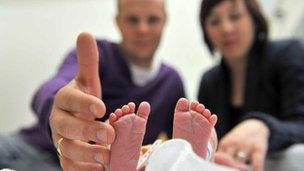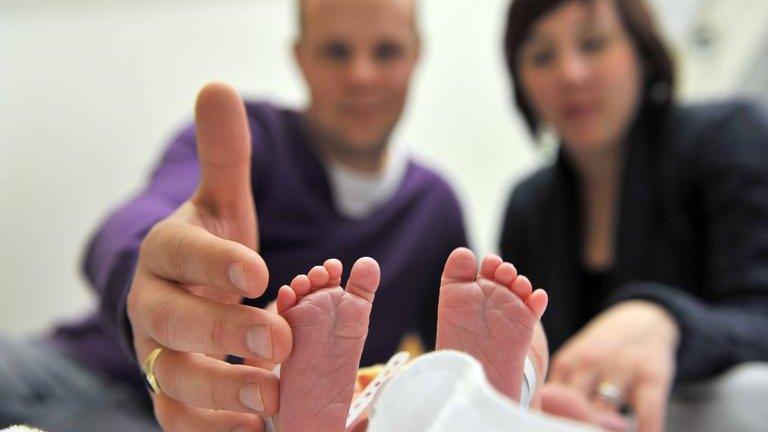High earners abroad may keep full child benefit
- Published

Child benefit payments to parents are changing from January 2013
High earners working abroad could hold on to all their child benefit despite having an income of more than £50,000, it has emerged.
From January, households where at least one person earns more than £50,000 will have the benefit reduced or stopped.
But because the change only applies to earnings taxed in the UK, families with a high earner working abroad may not face any cuts at all.
It is thought this is likely to be a small number of cases.
The Treasury said 85% of all families with children would be unaffected by the changes and would continue to receive child benefit in full.
However, tax experts said the anomaly showed the difficulty in applying the policy.
One million households are expected to receive letters from the HM Revenue and Customs (HMRC) this week about losing child benefit.
Child benefit is tax free and currently stands at £20.30 a week for the first child and £13.40 for each child after that.
Under the new approach, families where one parent earns between £50,000 and £60,000 will have their benefit reduced on a sliding scale, and will only lose the benefit entirely when earning over £60,000.
No Jurisdiction
For families with three children, losing the benefit is the equivalent of a £4,000 salary cut.
HMRC said the reductions in child benefit for high earners would only apply to money taxed in the UK.
This leaves open an anomaly where a person could have an income well above the £50,000 threshold, but not face any cuts to child benefit because it was earned and taxed abroad.
This would apply, for example, to a UK businessman working in Dubai and paying taxes there whose partner remains in the UK with their children, or to an EU national working in the UK whose partner has substantial earnings in their home country.
HMRC says only the income of the person living in the UK will be taken into account when it decides whether a household's child benefit should be reduced.
Frank Haskew, Head of Tax at the Institute for Chartered Accountants in England and Wales said: "This example encapsulates pretty well the anomalies in practice that this change will result in.
"You will end up with realities that don't match the actual economic circumstances of the family unit. You can have those with very high incomes, living abroad still able to claim child benefit, which highlights the cross-border difficulties in enforcing the policy.
"It will probably be only a minority of cases where this could be important but it will be difficult to assess how many families are affected."
Deficit reduction
David Heaton from accountancy firm Baker Tilly said it could be a particular problem for mobile families and the changes overall will make the system much more complicated.
The Daily Telegraph, external reported the changes may also be illegal under EU law because it could lead to discrimination between some EU citizens working in the UK, with some facing the cuts while others working in the same job do not.
Mr Heaton told BBC News it was a basic principle of EU law that there should be no discrimination between migrant workers and those who work in their home country.
However, HMRC insisted the legislation was "fully compliant with EU law".
Ministers say the changes, which take effect on 7 January, are needed to help the deficit reduction plan.
An HMRC spokesman said: "The Higher Income Child Benefit charge only applies to those within the UK tax net.
"Where a non-UK national earns over £50,000 working in the UK, they will have to pay the same Higher Income Child Benefit charge as any other taxpayer with the same income if they or their partner receive UK child benefit. If their partner's income is not subject to UK tax, it becomes irrelevant for tax purposes.
"Generally, where someone is not liable to UK tax, there is no requirement for HMRC to have details of their income, as they have no UK tax bill to pay."
- Published22 September 2014

- Published15 May 2012

- Published4 October 2010
